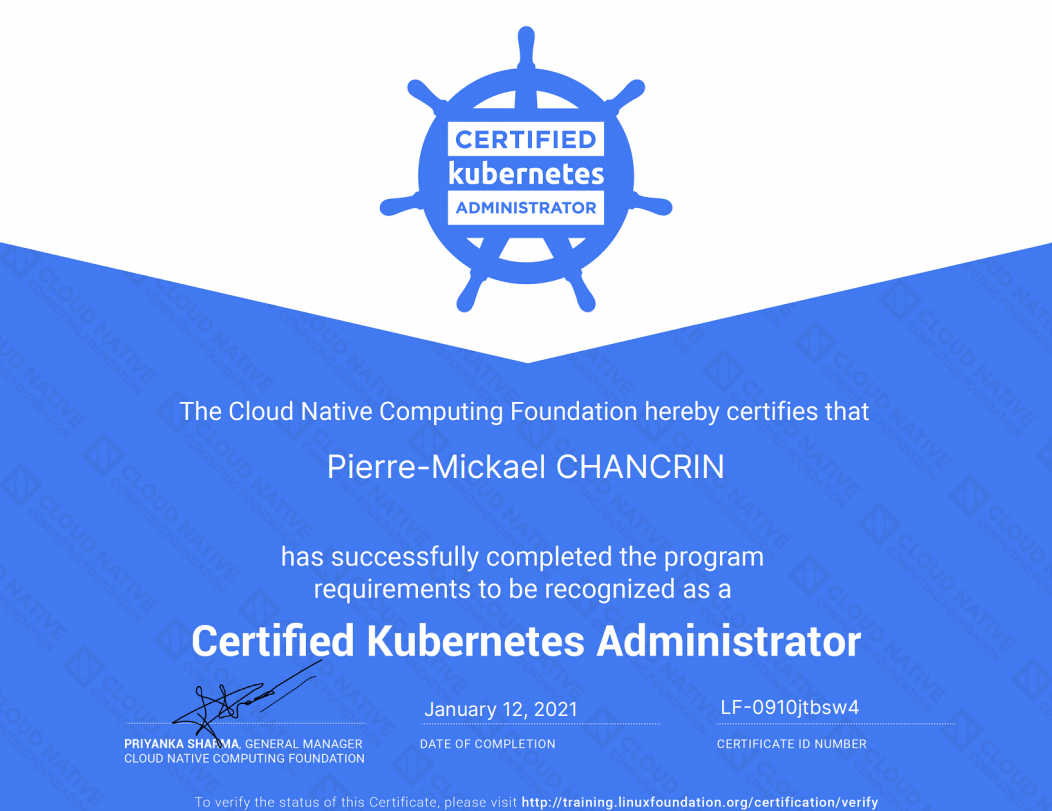Qu'est ce que la certification CKA ?
La CNCF propose trois certifications Kubernetes :
CKAD : Certification développeur en environnement micro-service
CKA : Certification dédiée aux administrateurs d’environnements micro-service
CKS : Certification orienté sécurité dans les environnements micro-service
A savoir que Kubernetes est un orchestrateur de container et se veut Cloud Agnostic, Kubernetes peut donc être mis en place chez n’importe quel provider Cloud.
L’examen CKA a changé en septembre 2020, voici les nouvelles grilles de notation des différentes sections :
- Cluster Architecture, Installation & Configuration – 25%
- Workloads & Scheduling – 15%
- Services & Networking – 20%
- Storage – 10%
- Troubleshooting – 30%
Voici le contenu des différentes sections :
Cluster Architecture, Installation & Configuration – 25%
- Manage role based access control (RBAC)
- Use Kubeadm to install a basic cluster
- Manage a highly-available Kubernetes cluster
- Provision underlying infrastructure to deploy a Kubernetes cluster
- Perform a version upgrade on a Kubernetes cluster using Kubeadm
- Implement etcd backup and restore
Workloads & Scheduling – 15%
- Understand deployments and how to perform rolling update and rollbacks.
- Use ConfigMaps and Secrets to configure applications.
- Know how to scale applications
- Understand the primitives used to create robust, self-healing, application deployments
- Understand how resource limits can affect Pod scheduling
- Awareness of manifest management and common templating tools
Services & Networking – 20%
- Understand host networking configuration on the cluster nodes
- Understand connectivity between Pods
- Understand ClusterIP, NodePort, LoadBalancer service types and endpoints
- Know how to use Ingress controllers and Ingress resources
- Know how to configure and use CoreDNS
- Choose an appropriate container network interface plugin
Storage – 10%
- Understand storage classes, persistent volumes
- Understand volume mode, access modes and reclaim policies for volumes
- Understand persistent volume claims primitive
- Know how to configure applications with persistent storage
Troubleshooting – 30%
- Evaluate cluster and node logging
- Understand how to monitor applications
- Manage container stdout & stderr logs
- Troubleshoot application failure
- Troubleshoot cluster component failure
- Troubleshoot networking
L’examen dure maintenant 2 heures au lieu de 3 heures et comporte 17 questions au lieu de 24 questions. Le score pour l’obtenir est de 66%
La partie Security a disparu, car elle a maintenant sa propre certification CKS. La certification CKA est un prérequis indispensable pour passer la CKS.
Comment préparer sa certification CKA ?
Les informations officielles concernant les certifications Kubernetes sont disponibles ici :
Certified Kubernetes Administrator (CKA) | Cloud Native Computing Foundation (cncf.io)
Vous pourrez voir à quoi ressemble l’interface de l’examen :
https://docs.linuxfoundation.org/tc-docs/certification/lf-candidate-handbook/exam-user-interface
Le code suivant permet de bénéficier de 15% sur le prix de l’examen. Vu qu’il est à 300€, c’est toujours bon à prendre : KUBERNETES15
Voici les cours que je vous conseille pour préparer cette certification :
- https://www.udemy.com/course/certified-kubernetes-administrator-with-practice-tests
- https://www.udemy.com/course/la_plateforme_k8s/
- https://www.udemy.com/course/kubernetes-les-bases-indispensables/
- https://www.whizlabs.com/certified-kubernetes-administrator/
- https://www.udemy.com/course/certified-kubernetes-administrator/?couponCode=AWSJ-CKA-SEP-20
Voici les labs disponibles en ligne :
- https://www.katacoda.com/courses/kubernetes
- https://labs.play-with-k8s.com/
- https://www.katacoda.com/fabito/scenarios/ckad
- https://killer.sh/
- https://dev.to/liptanbiswas/ckad-practice-questions-4mpn
Il existe des livres vraiment intéressants disponibles sur votre Kindle ou au format papier
Et après ?
Ensuite, je vous invite à tenter la CKS, pour cela, il existe deux supports indispensables pour la préparer.
Tout d’abord les cours suivants disponibles chez UDEMY
Kubernetes CKS 2021 Complete Course + Simulator | Udemy
Certified Kubernetes Security Specialist (CKS) | Udemy
Voici le cours en Francais disponible sur la plateforme EazyTraining
Kubernetes: Devenez Certified Kubernetes Security Specialist - eazyTraining
Puis les livres suivants
- eBook Archives | Aqua (aquasec.com)
- Amazon.fr - Learn Kubernetes Security: Securely orchestrate, scale, and manage your microservices in Kubernetes deployments - Huang, Kaizhe, Jumde, Pranjal, Degioanni, Loris - Livres


Maintenant, c’est à vous de jouer 😉



